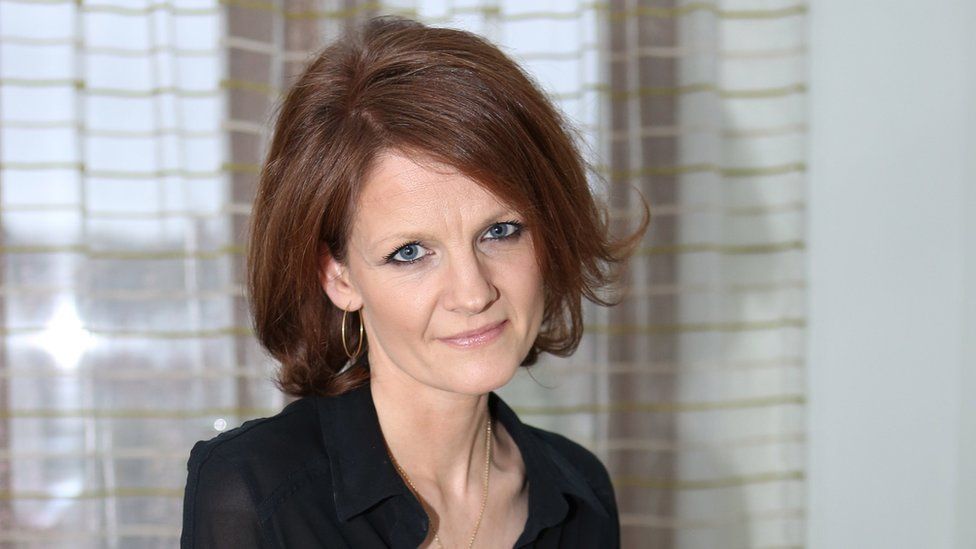Should 'catfishing' be made illegal?
- Published

Anna Rowe had a whirlwind romance with Antony Ray after meeting him through the dating app Tinder.
But their 14-month relationship came crashing down when she discovered his profile was a fake.
His name was not Antony and he was not single.
In fact, he was a married dad who had initially used photos of a Bollywood actor on his profile and had lured in other women too.
"He used me like a hotel with benefits under the disguise of a romantic, loving relationship that he knew I craved," says Anna.
The practice of using a fake profile to start an online romance is known as "catfishing".
Now Anna, 44, from Kent, has launched a petition calling for it to be made illegal.
But how serious is catfishing and is it practical to make it a crime?
More than half of online dating users say they have come across a fake profile, according to consumer group Which?
While the number of people defrauded in the UK by online dating scams reached a record high in 2016.
There were 3,889 victims of so-called romance fraud last year, who handed over a record £39m.
It has become so prevalent, that it led to the creation of reality TV show Catfish - which is dedicated to helping victims learn the true identity of their online romances.
Currently catfishing is not illegal but elements of the activity could be covered by different parts of the law.
If a victim hands over money, the "catfish" could be prosecuted for fraud.
Someone using a fake profile to post offensive messages or doctored images designed to humiliate could also face criminal action.
'Premeditated'
A review of social media and the law by the House of Lords in 2014 concluded there was enough current legislation to cover crimes committed online.
New guidance was also issued by the CPS in October to help the police identify online crimes - including trolling and virtual mobbing.
But Anna thinks the law needs to go further.
Writing on her petition, she said: "I did not or would not consent to have a sexual relationship with a married man, let alone a man who was actively having relations with multiple women simultaneously.
"His behaviour was definitely premeditated showing his intent to use women, yet the current law will not find his actions a criminal offence."
Tony Neate, chief executive of Get Safe Online, recognises the devastating impact catfishing can have on victims.
"It can ruin a life. I know there have been suicides because it's affected someone badly," he says.
"It can affect their mental stability and lead to depression and the victims feel they can't trust anyone again.
"I do think we need to look more wisely at this in relation to how it is tackled at the moment."
Built-in screening system
Mr Neate, a former police officer, says there should be a "discussion" about punishing the worst catfishing offenders.
But he raises concerns about how practical a new law would be to implement.
"I really feel for that poor woman [Anna] but we have got to be realistic on how far we got and how the police would be able to enforce it," he says.
"Let's have the discussion because we can't have people being hurt and it's something we have got to look at."
Many dating websites offer users advice on how to spot a scammer and tips to avoid being taken in by a fake profile. (See "Tips to avoid catfishes", below)
Popular dating site Match.com has a team which will remove unwanted accounts and check photos and personal ads.
It also has a built-in screening system that can help identify suspicious accounts, remove them and prevent re-registration.
Lovestruck has a verification service that can confirm members are single and professional by checking their profiles against their other social media sites.
'Genuine reasons'
But the advice has not stopped many people being duped.
Last month, university professor Judith Lathlean revealed how she was tricked out of £140,000 by a gang using a fake profile.
Ife Ojo, 31, and Olusegun Agbaje, 43, were jailed in 2016 after conning a woman out of £1.6m using a fictional character.
But Andrew McClelland, chief executive of the Online Dating Association - the trade body for the industry - believes legislating against catfishing would be "difficult".
He said there could be genuine reasons why someone might not use their real details online - for example if they had been in an abusive relationship and did not want their ex-partner to find them.
Data protection and freedom of expression would also be an issue when it came to enforcing such a law, he added.
"The biggest problem this faces is how do you legislate against someone lying?" says Mr McClelland.
Tips to avoid catfishes
- Ask lots of questions. Do not simply rely on the information given in someone's online profile
- Search. Use the internet as a tool to search elsewhere for information and the social media accounts of the person you are chatting to
- Speak to friends and family. Be guided by others on whether the profile appears genuine
- Chat on the dating site. Avoid giving out your personal number or email before really getting to know someone
- Never give out money. If someone asks for money on a dating website, do not send it to them
- Published23 January 2017
- Published12 February 2017
- Published21 October 2016